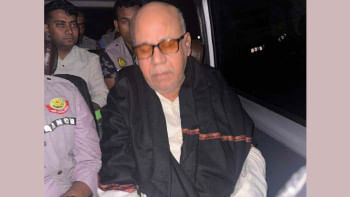ESC, DU holds third Bangladesh Economics Summit themed around Covid-19 impact

Economics Study Center (ESC), University of Dhaka organised the third Bangladesh Economics Summit under the theme "The Impact of Covid-19: Exposing the Fault Lines of Bangladesh Economy" from 12 September to 19 September 2020.
The one-week event hosted multiple segments such as panel discussions, public lecture, policy debate, paper presentation, quiz competition, book review competition, and an essay competition. Due to the current pandemic, all sessions were held on Zoom and broadcasted live on Facebook.
The first panel discussion session on "Governance Failure and Corruption: Impediment towards Tackling Covid-19" was chaired by Dr Selim Raihan, Professor, Department of Economics, University of Dhaka. He started the session by pointing out 3 major institutional challenges- the supremacy of deals over formal rules, the inefficiency of our regulatory body, and weak state capacity. The first panelist Professor Mustafizur Rahman, Distinguished Fellow, Centre for Policy Dialogue (CPD) pointed out the shortcomings of the growth-centric development paradigm of Bangladesh in this Covid-19 situation. The second panelist, Dr Kazi Maruful Islam, Professor, Department of Development Studies, University of Dhaka explained the Covid-19 situation from a political view. In his opinion, it is not merely a management issue, rather it stems from the lack of transparency and competition in the election process of the public offices. The final panelist, Dr Ahsan H. Mansur, Executive Director, Policy Research Institute (PRI) put more importance on establishing meritocracy and accountability in our system if we want to tackle any crisis like this.
On the second day of the summit, ESC organised a public lecture on ''Economic Effects of Covid-19 in Low and Middle-Income Countries'' where Dr Ahmed Mushfiq Mobarak, Professor of Economics at Yale University was present as the chief speaker. As the founder and faculty of Yale RISE (Research Initiative on Innovation & Scale), he has been working on the Covid-19 Response Policy with the governments of Bangladesh, Nepal, Sierra Leone and Nigeria and he focused on the economic analysis to support government responses to Covid-19 in LMICs in his lecture.
The second panel discussion on "Exploiting nature: Root causes for pandemics and climate disasters" was moderated by Dr M. M. Akash, Professor, Department of Economics, University of Dhaka. According to the first panelist, Dr A K Enamul Haque, Professor, Department of Economics, East West University, aiming at poverty reduction has snatched the limelight from the environmental sector and he focused on the fact that high rates of air pollution might increase the chance of spreading Covid-19. The second panelist, Dr Ainun Nishat, Professor Emeritus, BRAC University, pointed out how the lack of strict monitoring systems at airports and international land ports resulted in worsening the Covid-19 situation. The third panelist, Dr Qazi Kholiquzzaman Ahmad, Chairman, Palli Karma-Sahayak Foundation (PKSF) emphasised on the carbon emission issue and how it might be controlled, and how strict laws can help us to fight this battle of preserving the environment. Professor M.M. Akash concluded the discussion and mentioned how the expansion of neoliberalism in the international front might jeopardise the entire environmental movement.
The third discussion centered around "The Absence of Labor Rights and the Plight of Bangladeshi Workers during Covid-19". The session chair for the panel discussion was Dr Sayema Haque Bidisha, Professor, Department of Economics, University of Dhaka started the discussion saying that the labour market was heavily damaged by the pandemic. 85 percent of workers are in the informal economy whose rights are often being ignored and the benefits of incentive packages are not being available to them. The first panelist, Dr Rushidan Islam Rahman, Executive Chairperson, CDER, exhibited the problems of the ready-made garment workers who are not getting paid fairly or how some of them lost their jobs due to the pandemic, and trade-unions are mostly inactive regarding the issue. She mentioned that the education sector will also be impacted heavily and the graduates of this year and the next year will be affected the most. The next panelist was S K Jenefa K Jabbar, Director, Human Rights and Legal Aid Services and Social Compliance, BRAC, and began speaking about the legal sides of this issue. She said that the GDP growth was the highest in July, but the workers were laid off. So the question remained if it was at the cost of the workers. She also mentioned the problem of not having proper reliable data about workers in the formal sector. Dr Rizwanul Islam, Senior Visiting Fellow, CDER, started talking about the issue, pointing that the major issue of the economy is facing is a supply shock. He then presented a few statistics, where Bangladesh is in a bad place in terms of labour rights and emphasised on trade unions.
A policy debate was also organized on the topic "This house would sign an international treaty to provide Universal Healthcare Coverage for preventing infectious diseases" where most of the audience voted 'no' at the end of the debate on Facebook Live. ESC also launched the third edition of Bangladesh Students' Digest on Economics and Development (BSDED), a student journal showcasing research papers written by undergraduate and postgraduate level students in a session on 18 September 2020. The authors of the published papers presented their findings in the session where the session chair was Dr Atonu Rabbani, Associate Professor, Department of Economics, University of Dhaka. As a special guest, Dr Hossain Zillur Rahman, Chairperson, BRAC and Executive Chairman, PPRC was present. The final round of the quiz competition also took place after this session.
This year, the Bangladesh Economics Summit was able to connect academicians, policymakers, young economists and students to explore the underlying problems and its solutions despite the current crisis. The Daily Star was the Media Partner and the EMK Center was the Outreach Partner of this summit.


 For all latest news, follow The Daily Star's Google News channel.
For all latest news, follow The Daily Star's Google News channel. 



Comments